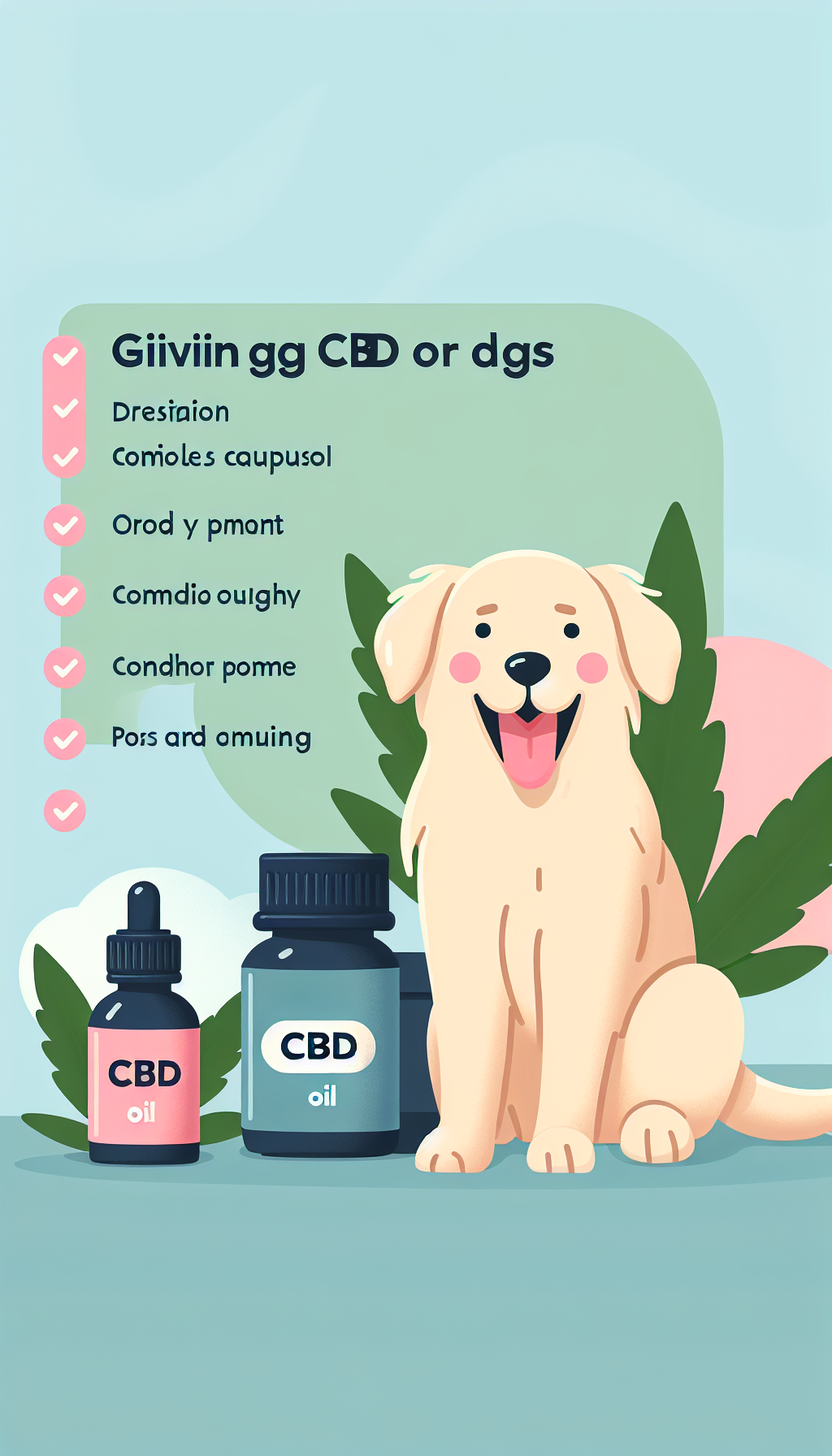Can You Give CBD to Dogs?
Introduction
Introduction:
CBD, short for cannabidiol, has gained popularity in recent years for its potential health benefits in humans. As pet owners seek natural remedies for their furry friends, the question arises: can you give CBD to dogs? In this article, we will explore the topic and provide an overview of the current understanding surrounding the use of CBD in dogs.
The Benefits of CBD for Dogs: Exploring its Potential Effects and Uses
Can You Give CBD to Dogs?
CBD, short for cannabidiol, has gained significant popularity in recent years for its potential health benefits. While it is commonly used by humans, many pet owners wonder if CBD can also be given to their furry friends. In this article, we will explore the benefits of CBD for dogs and its potential effects and uses.
First and foremost, it is important to note that CBD is derived from the hemp plant, which is a cousin of the marijuana plant. However, unlike marijuana, CBD does not contain the psychoactive compound THC, which is responsible for the “high” sensation. This means that CBD is safe for dogs and will not cause any intoxicating effects.
One of the main benefits of CBD for dogs is its potential to alleviate pain and inflammation. Just like humans, dogs can suffer from various conditions that cause discomfort, such as arthritis or injuries. CBD has been found to have anti-inflammatory properties, which can help reduce pain and improve mobility in dogs. Many pet owners have reported positive results after giving their dogs CBD for pain relief.
In addition to pain relief, CBD may also help dogs with anxiety and stress. Dogs can experience anxiety in various situations, such as separation anxiety or during thunderstorms. CBD has been shown to have calming effects on the nervous system, which can help dogs relax and feel more at ease. This can be particularly beneficial for dogs that have a history of anxiety or are easily stressed.
Furthermore, CBD may have potential anti-seizure properties, making it a promising option for dogs with epilepsy or other seizure disorders. While more research is needed in this area, some studies have shown that CBD can reduce the frequency and severity of seizures in both humans and animals. This has led many pet owners to consider CBD as an alternative treatment for their dogs’ seizures.
Another potential use of CBD for dogs is in the management of cancer symptoms. Just like humans, dogs can develop cancer, and the side effects of cancer treatments can be challenging to manage. CBD has been found to have anti-nausea and appetite-stimulating effects, which can help dogs undergoing chemotherapy or radiation therapy. Additionally, CBD may also have anti-tumor properties, although more research is needed to fully understand its potential in this area.
It is important to note that while CBD has shown promising results in various studies, it is always recommended to consult with a veterinarian before giving CBD to your dog. A veterinarian will be able to assess your dog’s specific needs and provide guidance on the appropriate dosage and administration method.
In conclusion, CBD has the potential to offer various benefits for dogs, including pain relief, anxiety reduction, seizure management, and cancer symptom management. However, it is crucial to consult with a veterinarian before giving CBD to your dog to ensure their safety and well-being. With proper guidance and care, CBD can be a valuable addition to your dog’s health regimen, helping them live a happier and healthier life.
CBD Dosage Guide for Dogs: Finding the Right Amount for Your Furry Friend

Can You Give CBD to Dogs?
CBD, short for cannabidiol, has gained popularity in recent years for its potential health benefits in humans. But what about our furry friends? Can dogs also benefit from CBD? The answer is yes, but it’s important to find the right dosage for your canine companion.
Before diving into the dosage guide, let’s first understand what CBD is and how it works. CBD is a compound found in the cannabis plant, but unlike its cousin THC, it does not have psychoactive effects. Instead, CBD interacts with the endocannabinoid system in both humans and dogs, which helps regulate various bodily functions.
When it comes to giving CBD to dogs, it’s crucial to start with a low dosage and gradually increase it if needed. Every dog is different, and what works for one may not work for another. It’s always best to consult with your veterinarian before introducing CBD into your dog’s routine.
When determining the right dosage, factors such as your dog’s weight, size, and overall health should be taken into consideration. A general rule of thumb is to start with 0.2mg of CBD per pound of body weight. For example, if your dog weighs 20 pounds, you would start with a 4mg dosage.
It’s important to note that CBD products come in various forms, including oils, treats, and capsules. Each product may have a different concentration of CBD, so it’s essential to read the label carefully. For instance, if you have a CBD oil with a concentration of 250mg per bottle, and each drop contains 0.5mg of CBD, you can easily calculate the dosage for your dog.
When administering CBD to your dog, it’s best to mix it with their food or treats to ensure they consume it without any issues. Some dogs may not enjoy the taste of CBD oil, so mixing it with something they love can make the experience more enjoyable for them.
As you start giving CBD to your dog, it’s crucial to monitor their behavior and overall well-being. Keep an eye out for any changes in appetite, energy levels, or mood. If you notice any adverse effects, such as lethargy or gastrointestinal issues, it may be a sign that the dosage is too high. In such cases, it’s recommended to lower the dosage or consult with your veterinarian.
It’s also worth mentioning that CBD is not a cure-all solution for every ailment your dog may have. While it may help with certain conditions such as anxiety, pain, or inflammation, it’s not a substitute for proper veterinary care. Always consult with your veterinarian if your dog is experiencing any health issues.
In conclusion, CBD can be beneficial for dogs, but finding the right dosage is crucial. Start with a low dosage and gradually increase it if needed, while closely monitoring your dog’s response. Remember to consult with your veterinarian before introducing CBD into your dog’s routine, and always prioritize their overall well-being. With the right dosage and proper care, CBD can potentially improve your furry friend’s quality of life.
CBD vs. Traditional Medications for Dogs: Examining the Differences and Considerations
CBD vs. Traditional Medications for Dogs: Examining the Differences and Considerations
When it comes to our furry friends, we always want what’s best for them. So, it’s no surprise that many pet owners are turning to alternative treatments like CBD to help alleviate their dogs’ ailments. But is it safe? Can you give CBD to dogs? Let’s take a closer look at the differences between CBD and traditional medications for dogs and consider the factors to keep in mind.
CBD, short for cannabidiol, is a compound derived from the hemp plant. Unlike its cousin THC, CBD does not have psychoactive properties, meaning it won’t get your dog high. Instead, it interacts with the endocannabinoid system in their bodies, which helps regulate various physiological processes. This interaction is believed to provide a range of potential health benefits for dogs, including pain relief, reduced anxiety, and improved overall well-being.
Traditional medications, on the other hand, are typically prescribed by veterinarians and are often pharmaceutical drugs. These medications have undergone extensive testing and are regulated by government agencies to ensure their safety and efficacy. They are designed to target specific conditions or symptoms and can be highly effective in managing various health issues in dogs.
So, how do CBD and traditional medications differ? One key difference lies in their origins. CBD is a natural compound derived from plants, while traditional medications are often synthesized in laboratories. This natural aspect of CBD is appealing to many pet owners who prefer a more holistic approach to their dogs’ health.
Another difference is the potential side effects. Traditional medications can sometimes cause adverse reactions in dogs, ranging from mild to severe. These side effects can include drowsiness, upset stomach, or even organ damage in rare cases. CBD, on the other hand, is generally well-tolerated by dogs and has a low risk of side effects. However, it’s important to note that every dog is unique, and some may still experience mild side effects such as dry mouth or drowsiness.
When considering CBD for your dog, it’s crucial to consult with your veterinarian. They can provide guidance on whether CBD is suitable for your dog’s specific condition and help determine the appropriate dosage. It’s important to remember that CBD is not a cure-all and may not be effective for every dog or every condition. Your veterinarian will be able to assess your dog’s individual needs and recommend the best course of action.
Additionally, it’s essential to choose high-quality CBD products specifically formulated for dogs. Not all CBD products are created equal, and some may contain harmful additives or insufficient amounts of CBD. Look for products that have been third-party tested for purity and potency, and opt for organic, full-spectrum CBD oils whenever possible.
In conclusion, CBD can be a viable alternative to traditional medications for dogs, offering potential health benefits with fewer side effects. However, it’s crucial to consult with your veterinarian before introducing CBD into your dog’s routine. They can provide expert advice tailored to your dog’s specific needs and ensure that CBD is used safely and effectively. With the right guidance and high-quality products, CBD may just be the natural solution you’ve been looking for to help improve your dog’s well-being.
Q&A
1. Can you give CBD to dogs?
Yes, CBD can be given to dogs.
2. Is CBD safe for dogs?
CBD is generally considered safe for dogs, but it’s important to consult with a veterinarian before giving it to your pet.
3. What are the potential benefits of giving CBD to dogs?
CBD may help with various conditions in dogs, such as anxiety, pain, inflammation, seizures, and certain skin conditions. However, more research is needed to fully understand its effects on dogs.
Conclusion
In conclusion, CBD can be given to dogs as a potential treatment for various health conditions. However, it is important to consult with a veterinarian before administering CBD to ensure proper dosage and to consider any potential risks or interactions with other medications.
![]()



